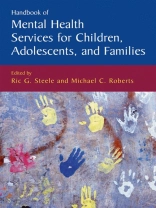Social, economic, and theoretical changes in the current clinical landscape are adding up to profound changes in children’s services–not the least of which is an expanded need for mental health services. Professionals–novices and veteran clinicians alike–wonder how to fill this demand in the present climate of turf wars, reorganizations, and budget cuts. The Handbook of Mental Health Services for Children, Adolescents, and Families cogently analyzes the issues and provides the answers, from current issues and emerging therapeutic trends to new avenues of treatment. Thoroughly researches and documented buy industry experts, it presents the widest range of mental health services available to youth and their families.
Areas of coverage include:
Specific modalities in service delivery, including in-patient and day treatment facilities, pediatric hospitals, and community mental health centers as well as rural, school, and primary care settings.
Services tailored to special populations, such as adolescent sex offenders, homeless children and their families, children with chronic illness, oppositional teens, abuse situations, and children exposed to traumatic events.
Details on preventative programs for child abuse, substance abuse, STD’s, and gang violence.
An in-depth examination of the latest developments in children’s services, including therapeutic camping and Internet-based treatment.
Approaches and methods for evaluating service organization, delivery, and efficacy.
Few areas of mental health care demonstrate the need for complementary services as much as child and family practice does. With this need firmly in mind, the Handbook encourages creativity and collaboration within practice settings and across agencies. For clinicians, administrators, school practitioners, and advanced-level students, this is a reference certain to havelasting impact on the field.
Spis treści
Mental Health Services for Children, Adolescents, and Families.- Mental Health Services for Young Children.- School Psychology Services.- Providing Services within a School-Based Intensive Mental Health Program.- Inpatient Pediatric Consultation-Liaison.- Mental Health Services for Children in Pediatric Primary Care Settings.- Providing a Range of Services to Fit the Needs of Youth in Community Mental Health Centers.- Outpatient-Private Practice Model.- Inpatient Treatment Models.- Child Abuse Prevention and Intervention Services.- Services to Prevent Sexually Transmitted Diseases in Adolescents.- Treatment Services for Adolescent Substance Abuse.- Targeted Prevention of Antisocial Behavior in Children.- Implementing Effective Youth Violence Prevention Programs in Community Settings.- Adolescent Sex Offender Programs.- Rural Mental Health Services.- Mental Health Services for Children with Chronic Illness.- Psychological Services for Children and Families Who Are Homeless.- Telehealth/Internet Services for Children, Adolescents, and Families.- Therapeutic Camping Programs.- Implementation of the Felix Consent Decree in Hawaii.- Children’s Services in Disasters and Other Emergencies.- Program Evaluation Approaches to Service Delivery in Child and Family Mental Health.- Large-Scale Evaluations of Children’s Mental Health Services.- Methodological Challenges in the National Evaluation of the Comprehensive Community Mental Health Services for Children and Their Families Program.- The Future of Mental Health Service Delivery for Children, Adolescents, and Families.
O autorze
Ric G. Steele, Ph.D., ABPP, is an Associate Professor of Psychology and Applied Behavioral Science at the University of Kansas, in the Clinical Child Psychology Program. He earned his doctorate from the University of Georgia in clinical psychology, with a specialization in clinical child psychology, completed a clinical internship at the University of Tennessee (Memphis) Professional Psychology Internship Consortium, and completed a Post-Doctoral Fellowship at the St. Jude Children’s Research Hospital (Memphis, TN). Dr. Steele is an associate editor for the Journal of Child and Family Studies, and is on the editorial boards of the Journal of Clinical Child and Adolescent Psychology and the Journal of Pediatric Psychology. He has published more than 40 journal articles and book chapters, and recently co-edited the Handbook of Mental Health Services for Children, Adolescents, and Families. Dr. Steele’s research is concerned with the promotion of physical and mental health across a continuum of health risk categories including healthy children, children at risk for disease, and children with diagnosed medical conditions.












